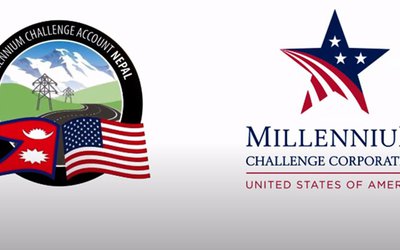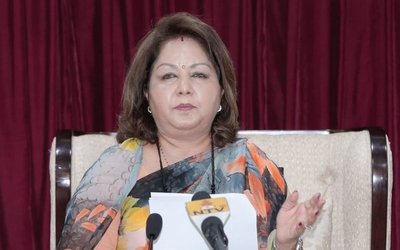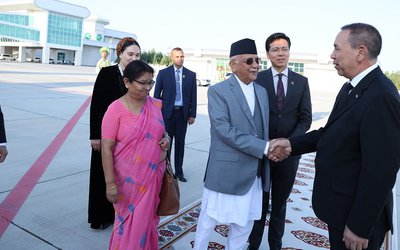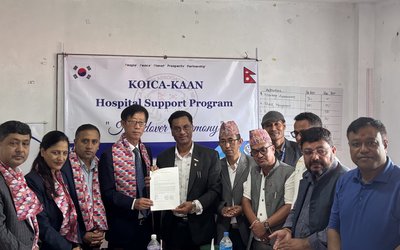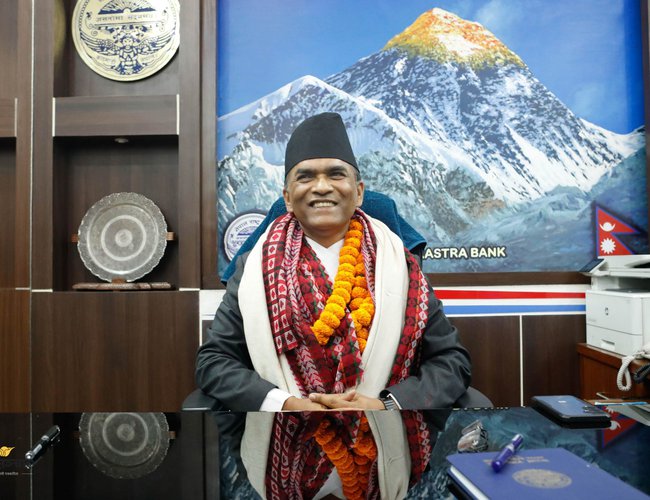
Following the 48-hour ultimatum issued by NC leader Sher Bahadur Deuba, Prime Minister KP Sharma Oli relented and appointed Biswo Poudel as the governor of Nepal Rastra Bank, putting an end to months of uncertainty and speculation.
Despite an agreement with the Nepali Congress to allow their nominee for governor, UML leader and Prime Minister Oli engaged in a covert game with NC leader Deuba and the Nepali Congress. Deuba informed PM Oli that he would not compromise on his second candidate after Gunakar Bhatta. Under mounting pressure from party members, NC leader Deuba was forced to issue a 48-hour ultimatum to appoint their nominee Poudel or face withdrawal of support. Benefiting from the coalition, CPN-UML leader instructed Finance Minister Bishnu Poudel to convene the recommendation committee meeting and approve the name presented by the NC. This political crisis and drama have now been averted.
After all the political maneuvers and drama, the Nepal Rastra Bank has finally gained new leadership. On Tuesday (May 20), the Council of Ministers appointed economist Bishwonath Poudel as the 18th Governor of Nepal Rastra Bank.
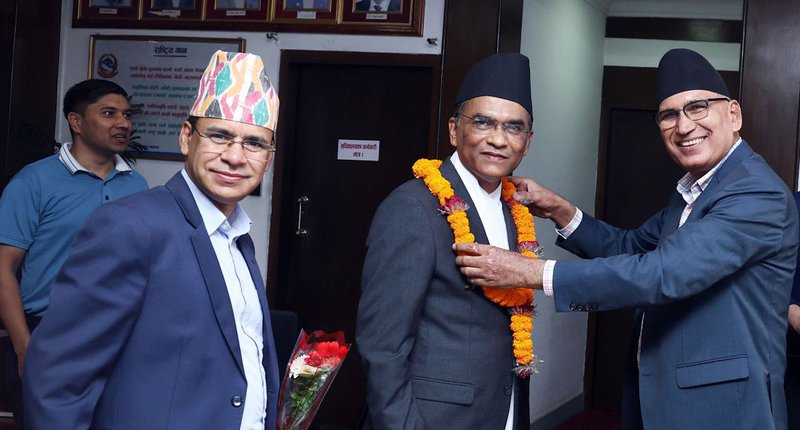
It has been 69 years since Himalaya Shamsher JBR became the central bank's first governor on Baisakh 14, 2013 B.S. (April 26, 1956). As Poudel takes on this crucial role, he will undoubtedly face numerous challenges.
These challenges include protecting the autonomy of the central bank and implementing effective economic support policies. Here are five key challenges identified by top economists:
Restoring the Central Bank's Credibility
The credibility of the Nepal Rastra Bank has been questioned recently due to delays in the appointment of the governor and the political controversies surrounding it.
Economist Dr. Bishwambhar Pyakuryal notes, "There was significant political interference during the appointment process. The new governor must work diligently to regain trust."
While the law prohibits the governor from being affiliated with any political party, concerns have been raised about Poudel's past ties to the Nepali Congress party, leading to a legal challenge to his appointment.
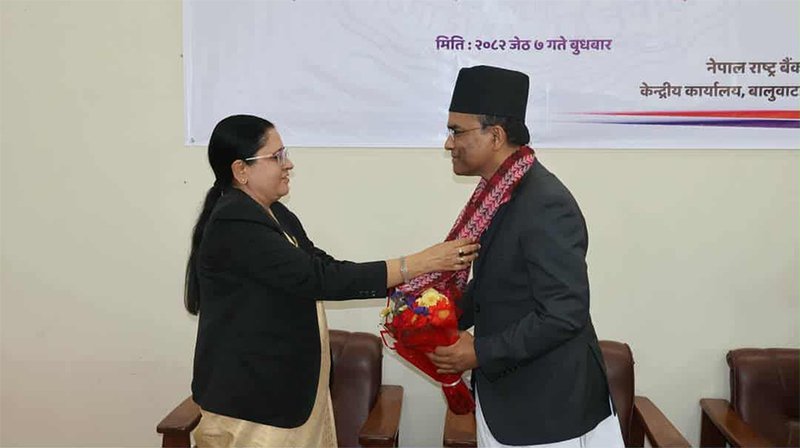
Preserving the Autonomy of the Central Bank
In addition to rebuilding credibility, Poudel must also ensure the central bank's independence is maintained professionally. Former Executive Director of the Nepal Rastra Bank and economist Nar Bahadur Thapa emphasizes, "Maintaining the bank's autonomy in a professional manner is a critical challenge."
Central banks worldwide are expected to provide independent economic advice to their governments. In Nepal, there have been instances where governors were dismissed due to government dissatisfaction, only to be reinstated by the court.
International organizations like the International Monetary Fund (IMF) closely monitor the independence of central banks.
Building Trust with Bank Employees
Former Governor Dipendra Bahadur Kshetry believes that due to the perceived political influence in the appointment, gaining the trust and confidence of the central bank's staff will be a challenge for Poudel.
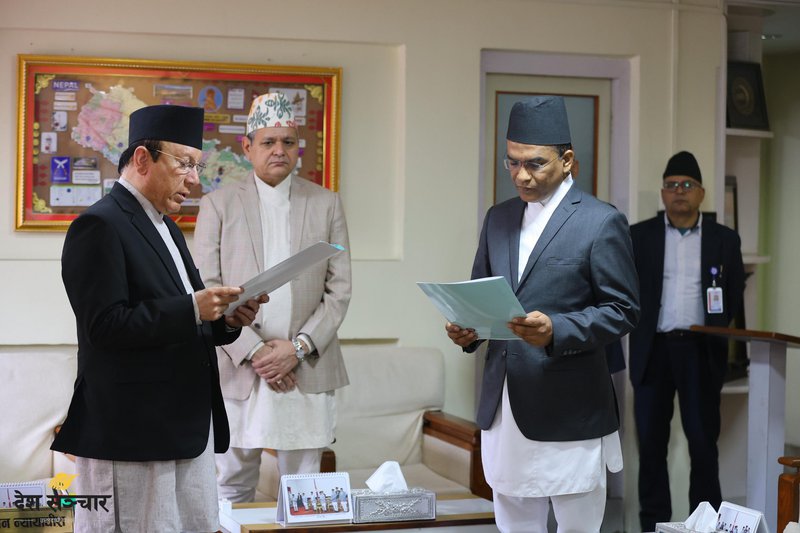
Removal from FATF 'Grey List'
On the day Bishwo Poudel was appointed as the new governor, the Financial Information Unit (FIU) of Nepal Rastra Bank released a report indicating a nearly 49% increase in "suspicious transactions/activities" in Nepal in 2024 compared to the previous year.
Banks and financial institutions must report transactions to the FIU if they suspect money laundering, tax evasion, corruption, or other irregularities.
On February 21 of this year, Nepal was placed on the Financial Action Task Force (FATF)'s "grey list" for the second time—a list for countries with strategic deficiencies in combating money laundering and terrorist financing.
FATF, which coordinates global efforts against money laundering and terror financing, can place countries on the "grey list" or the more severe "black list" if they do not meet its standards.
Nepal was previously on the grey list in 2008 and had to wait until 2014 to be removed. Being on this list can lead to negative consequences such as harm to international reputation, increased complexity in international banking transactions, and a decrease in foreign aid and investment.
The government has committed to removing Nepal from the list within two years, with the central bank and its leadership playing a crucial role in achieving this goal. Economist Nar Bahadur Thapa emphasizes the need for the governor to collaborate with the government to expedite Nepal's removal from the list. Thapa also stresses the importance of implementing risk-based supervision of banks, financial institutions, and cooperatives, addressing concerns raised by FATF.
Previously, the central bank refrained from supervising cooperatives due to political interference, but Thapa argues that this excuse is no longer valid. Economist Dr. Pyakuryal acknowledges the challenges ahead, citing recent corruption scandals and increased scrutiny on politicians' income sources. He emphasizes the necessity for concrete actions and tough decisions to address these issues.
Despite lower interest rates, the private sector reports a sluggish economy with a lack of demand hindering economic activity.
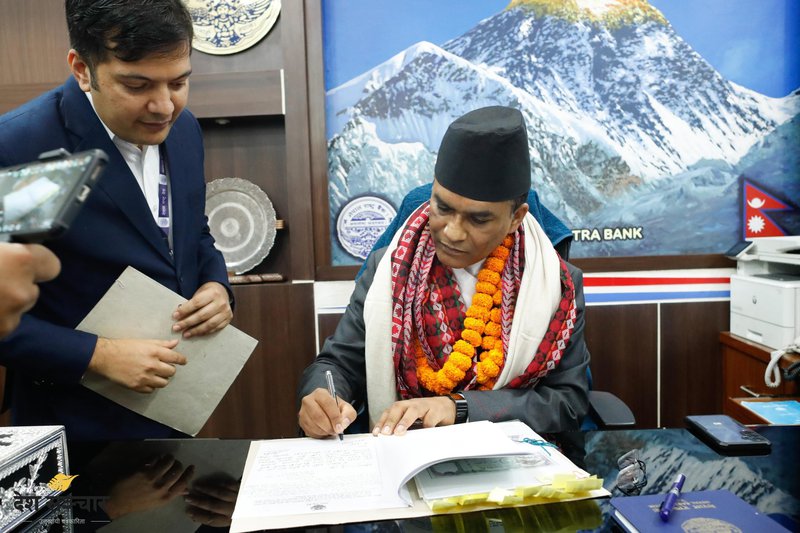
Economic revitalization and policy coordination are crucial in addressing these challenges. While monetary policy has historically regulated loan disbursement, there are concerns about the current lack of loan demand despite more favorable interest rates.
Remittances have led to an abundance of money and a relaxed policy environment, but there is still a lack of market demand. Small and medium-sized enterprises (SMEs), which were impacted by the COVID crisis, continue to face challenges. The government is focusing on short-term solutions by increasing taxes," explained economist Dr. Bishwambhar Pyakuryal.
He emphasized that the new governor must implement policy-level reforms through monetary policy to stimulate the economy.
"There is excess liquidity and low interest rates, yet the financial sector is not effectively supporting the economy. The new governor needs to address this issue," added economist Nar Bahadur Thapa.
Both economists recommended that the governor engage in extensive consultations with the private sector and SMEs to find viable solutions.
While central banks provide economic advice to governments, they are also expected to operate independently. Organizations like the IMF closely monitor this independence.
Due to differing political agendas, disagreements may arise between the government and the central bank.
Governments, driven by electoral and political pressures, often prioritize rapid economic growth and prefer relaxed lending conditions. In contrast, central banks are concerned about the potential risks of excessive credit flow, such as destabilizing the banking sector or causing high inflation.
Tensions in the past have resulted in the removal of central bank governors in Nepal, such as the case of former governor Maha Prasad Adhikari who was dismissed two years ago due to conflicts with then Finance Minister Janardan Sharma. However, Adhikari was later reinstated by the court. The
disagreement at that time was reportedly related to strategies for revitalizing the economy.
Experts now stress the importance of the central bank maintaining its autonomy while also collaborating closely with the government to address economic challenges. The current Finance Minister, Bishnu Poudel, is affiliated with the CPN-UML, while Governor Poudel had previously run for elections under a Nepali Congress ticket. Given their political backgrounds, it is crucial for them to coordinate effectively.
As Nepal prepares to graduate from the Least Developed Country (LDC) status in 2026, there are concerns about potential challenges that may arise. Dr. Bishwambhar Pyakuryal advises that the Nepal Rastra Bank leadership should be mindful of the implications, such as limited access to concessional loans and further shrinkage of exports.
Leveraging the Power of the External Sector
Economists are of the opinion that Nepal's external sector, encompassing factors like remittances, foreign exchange reserves, and trade balances, has shown resilience in recent times.
In the first nine months of the current fiscal year alone, remittance earnings have totaled nearly NPR 1.2 trillion.
The balance of payments, indicating the disparity between inflow and outflow of funds, displays a surplus of NPR 346 billion.

Foreign exchange reserves have witnessed a significant increase, rising by almost 20% compared to the previous Asar (mid-July) to approximately NPR 2.426 trillion. This amount is sufficient to cover over 14 months of imports of goods and services.
Inflation, as gauged by the consumer price index, has decreased to a record low of 3.39%, marking the lowest level in several months.
"The current task is to direct the surplus liquidity towards productive sectors. The governor should focus on investing in areas like agriculture, manufacturing industries, and infrastructure that offer quick returns," suggests economist Dr. Pyakuryal.
He further emphasizes that efficient utilization of these resources would not only boost employment and domestic demand but also foster the growth of small and medium-sized enterprises (SMEs), which are vital for the economy.
Governor Appointment Finalized After Delays
The government has appointed economist Bishwonath Poudel as the new Governor of Nepal Rastra Bank.
Government spokesperson and Minister for Communication and Information Technology, Prithvi Subba Gurung, confirmed that the Cabinet meeting on Tuesday evening selected the new executive head of the central bank.
"The governor appointment process had been delayed due to successive resignations by members of the recommendation committee at different times," said Gurung in an interview with the BBC. “After Poshraj Pandey was recently added to the committee, it recommended three candidates: Bishwonath Poudel, Acting Governor Neelam Dhungana, and former Secretary Dinesh Bhattarai. Among them, the Cabinet chose Poudel as governor.”
The position had been vacant since March 24, when former governor Maha Prasad Adhikari retired. The delay in appointment had drawn criticism toward the government.
Political Deal, Committee Dynamics, and Legal Clearance behind Poudel’s Appointment as Governor
On Tuesday afternoon, amid reports that Prime Minister KP Sharma Oli and Nepali Congress President Sher Bahadur Deuba had reached an agreement to appoint Bishwo Poudel as the new governor, a meeting of the Governor Recommendation Committee also convened and recommended three names—including Poudel—for the position.
The committee, led by Deputy Prime Minister and Finance Minister Bishnu Prasad Poudel, consists of outgoing governor Maha Prasad Adhikari and economist Dr. Poshraj Pandey as members. According to legal provisions, this committee suggests three candidates, from whom the government chooses one to be appointed as Governor of Nepal Rastra Bank.
Poudel himself was previously a member of the Recommendation Committee. He resigned from the committee after being nominated as a candidate for governor by coalition partner Nepali Congress, which sparked criticism.
Following his resignation, the committee underwent restructuring. Another former committee member, Dr. Bijay Nath Bhattarai, also resigned, citing the committee's failure to hold meetings.
After a prolonged deadlock over the governor appointment, which reportedly caused tensions between the ruling CPN-UML and Nepali Congress, Poudel was eventually appointed.
Other Candidates and Political Maneuvering
Before Poudel's appointment, there was speculation that Dr. Gunakar Bhatta, Executive Director at the central bank, might be appointed governor.
However, his resignation reportedly went unapproved for an extended period by acting governor Neelam Dhungana, which led the Nepali Congress leadership to put forward Bishwo Poudel as an alternative candidate.
Legal Challenges, Political Affiliation, and Criticism Surrounding Poudel’s Appointment.
Legal Petition against Writ Dismissal
Advocate Pratibha Upreti, along with others, filed a petition challenging the Supreme Court’s decision to dismiss the writ that had opposed Bishwo Poudel’s appointment.
Poudel’s political alignment has come under scrutiny since he previously ran as a Nepali Congress candidate in the last general election but was defeated.
After his name emerged as a frontrunner for governor, Hari Dhakal, a Member of Parliament from the Rastriya Swatantra Party who defeated Poudel in that election, criticized the nomination during a parliamentary session. Dhakal called the move a “shameful practice and a historic mistake.”
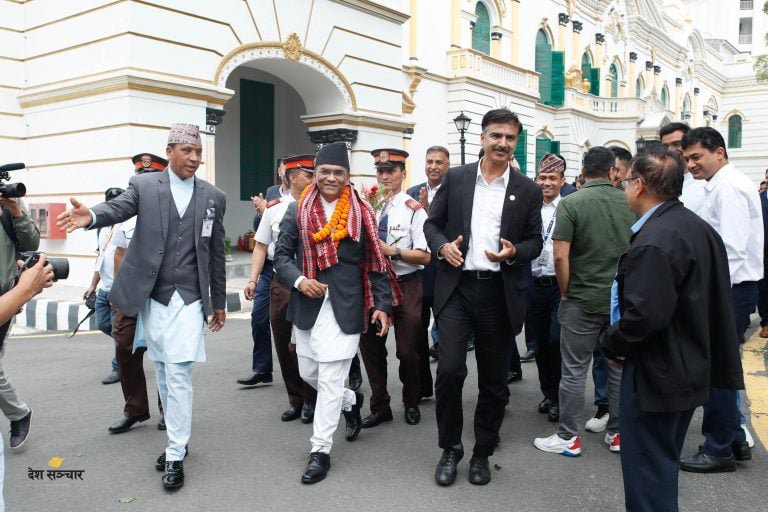
"A person who ran against me in an election is now being openly pushed forward," he said. "Despite knowing the negative impacts of politicizing institutions like the central bank, political parties are brazenly promoting their affiliates. This is deeply condemnable and violates the Nepal Rastra Bank Act itself."
Legal Restrictions on Political Affiliations
As per Clause 21 of the Nepal Rastra Bank Act, 2058 (2001 A.D.), individuals who are members or officeholders of a political party are ineligible for appointment as Governor, Deputy Governor, or Director of the bank.
However, Poudel officially renounced his party affiliation two years ago.He resigned from both general and active membership of the Nepali Congress in Ashar 2080 (June/July 2023).
Political Disputes Regarding the Appointment
The term of former governor Maha Prasad Adhikari ended on Chaitra 24 (April 6, 2024). According to the Nepal Rastra Bank Act, a new governor should ideally be appointed one month before the position becomes vacant.
The prolonged delay in appointing a new governor sparked criticism that the coalition partners (Nepali Congress and CPN-UML) were not giving due importance to the appointment of the central bank's leadership.
Various media reports indicated that the delay was due to disagreements over power-sharing between the two ruling parties.
Experts cautioned that such delays in appointing a central bank governor, especially for political negotiations, raise legal and ethical concerns.
Former Governor Dipendra Bahadur Kshetry expressed concern about the excessive politicization of the governor's post.
"Despite claims of political parties maturing through experience, their actions still show self-interest. They are focused on pushing their agendas at any cost, and their decisions reflect that mindset," Kshetry noted.
Former Governor Dipendra Bahadur Kshetry stresses that as the governor is a key leader, delays in appointment can result in essential tasks being left unfinished, necessary policies not being developed, and broader economic disruptions for the country. He emphasizes the importance of taking such matters seriously.
The term for a central bank governor is five years.
As Poudel takes on the role, Kshetry highlights that Nepal's economy is currently on the FATF 'grey list', with most challenges linked to the banking and financial sector, making the upcoming task particularly challenging.
Given his recent appointment just before the national budget, Kshetry believes it could be challenging for him to quickly develop and execute a comprehensive five-year strategy. Additionally, there may be legal obstacles to overcome due to potential court challenges regarding his appointment. With ongoing political factionalism, it may take a significant amount of time for him to build trust among his peers."
Poudel has assumed the role of governor at Nepal Rastra Bank, but he is expected to encounter numerous obstacles and difficulties, including the task of rebuilding the bank's credibility.
- EU’S ERASMUS MUNDUS: Scholarship For Quality Education
- Aug 05, 2025
- ADB: Partnership For Growth
- Aug 04, 2025
- HCC-N: Economic Ambassador
- Aug 03, 2025
- MONETARY POLICY: Disappointing Outcome
- Jul 17, 2025
- MELAMCHI WATER SUPPLY: No Interruption During Monsoon
- Jun 25, 2025



